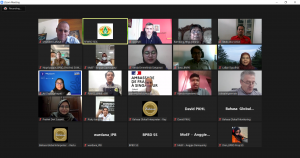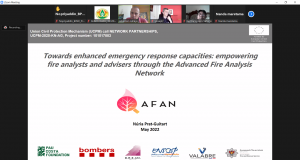|
|
|
Bogor – West Java , 9 July 2022
Author: Bambang Hero Saharjo
On 29 June 2022, the LoA between the French Embassy and Timor Leste in Indonesia was successfully signed, represented by Jean-Michel DUMAZ (The Civil Protection Regional Expert, localized in the French Embassy to Singapore) and Prof. Dodik Ridho Nurrohmat (Vice-Rector). for International Affairs, Collaboration, and Alumni Relations) representing IPB University. The collaboration is about “RAINFORESTS AND PEATLANDS FIRES CENTER of EXCELLENCE”.
This project aims to support IPB for science-based education and training capabilities development in the field of peatland and forest fires prevention, contingency, and suppression. The French Embassy will implement through the project a pluriannual program for expertise sharing, that will include a Master’s degree education in France, several trainings of trainers (ToT) activities, digital solutions for education implementation, equipment for field fire response procurement.
The project is qualified as Centre of Excellence (CoE) for the enhanced expertise shared, and for the innovative education tools implemented, as virtual reality, simulation and learning management systems. Physically located in Bogor in IPB facilities, the CoE will deliver from the expertise shared from France, education programs for the Indonesian community involved in forest and peatland fires management. The CoE will also implement education sessions for the ASEAN and overseas countries, in particular those having similar forest and peatland and strongly affected by fires
Areas of Cooperation
The development of the cooperation regarding the development of the rainforest and peatland fires center of excellence will particularly focus on the following areas:
- a) Education and training, skills, and expertise development
- b) Knowledge management,
- c) Learning tools and systems
- d) Fires data collection and Lessons learned
- e) Scientist cooperation
Forms of Cooperation
In each afore-mentioned area, the cooperation may result in:
− Sharing of knowledge, expertise, and best practices,
− Higher education and research partnerships,
− Provision of experts, instructors, and specialist for training and technical assistance,
− Exchange of experts or trainees in the framework of study visits or training activities,
− Participation in meetings, conferences, or seminars,
− Implementation of digital tool for learning and education,
− Supply of equipment for field trainings and experiments
The cooperation that the Signatories intend to implement will be developed for a period of five (05) years from the date of the signing of the present Agreement. It may be extended for further periods of five (05) years provided the Signatories jointly express such an intent. The Signatories may decide to put an end to this cooperation, by notifying the other Signatory of this intention three (03) months in advance.
As a follow-up to the above collaboration, training activities on “Fire Behavior Analyst” have been carried out for 4 days from 4 to 7 July 2022 which take place from 13.00 to 17.00 every day. The training was provided by French fire experts, namely Sebastien LAHAYE, Xavier JOSEPH and Jean-Michel DUMAZ. The training was officially opened by Jean-Michel Dumaz, and the Executive Director of the Regional Fire Management Resource Center-Southeast Asia Prof. Dr. Ir. Bambang Hero Saharjo, M.Agr. The training was facilitated by the Regional Fire Management Resource Center-Southeast Asia followed by IPB University (Faculty of Forestry and Environment), BNPB, BPBD South Sumatra, BPBD North Sumatra, Directorate of Forest and Land Fire Control, Directorate General of PPI, Ministry of Environment and Forestry; and the Sumatra Regional Land and Forest Fire Climate Change Control Center.
The training is carried out in English assisted by a translator into Indonesian, making it easier to understand the material presented. The training is carried out online with the support of training materials written in English. During the training, discussions were held related to the material provided which was related to the conditions and efforts made by the government.
On the final day of the training, a questionnaire with 20 questions related to the material provided was held in order to understand the extent to which the participants had understood the material presented by experts from France and its implications for fire control efforts carried out by the government. As a final word, all participants were happy with the material provided and not a few of the material provided was something new for them, so not a few of the participants suggested that this training be continued, including the training carried out in the field. As a form of attendance of the training participants, the French Embassy gave a certificate.







